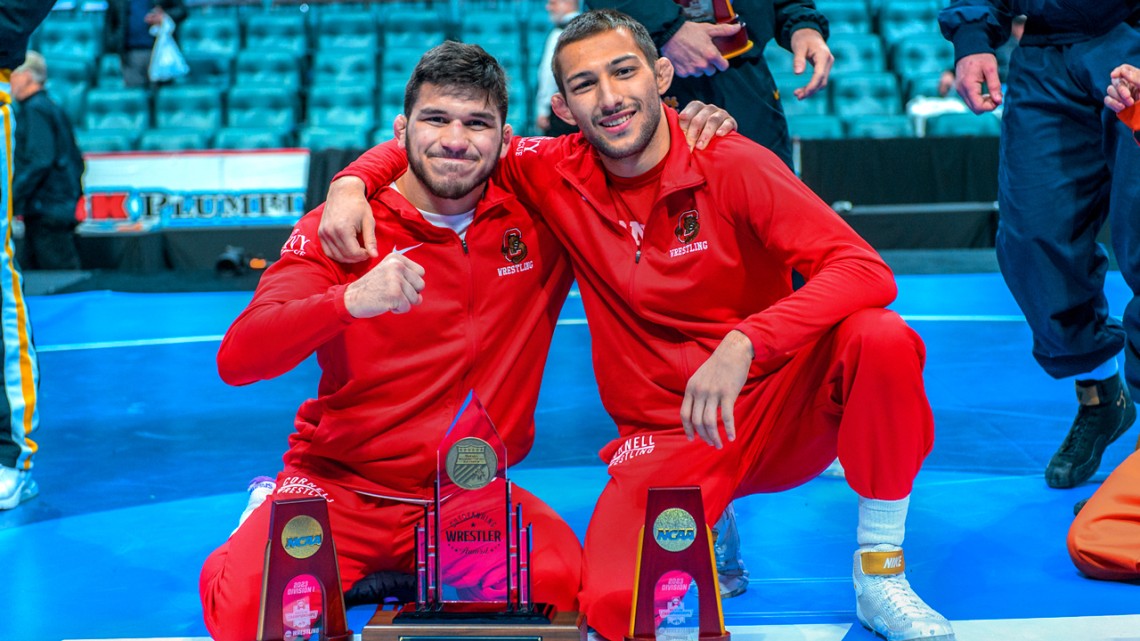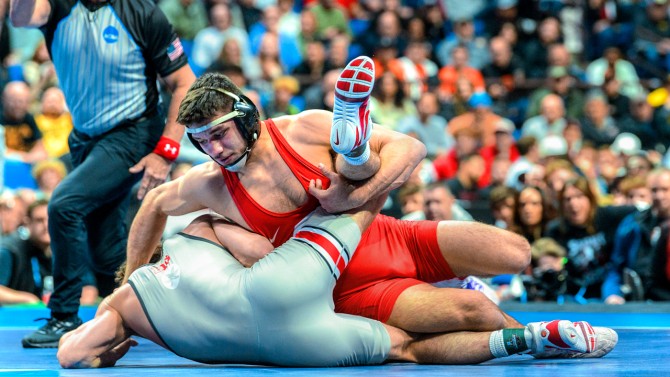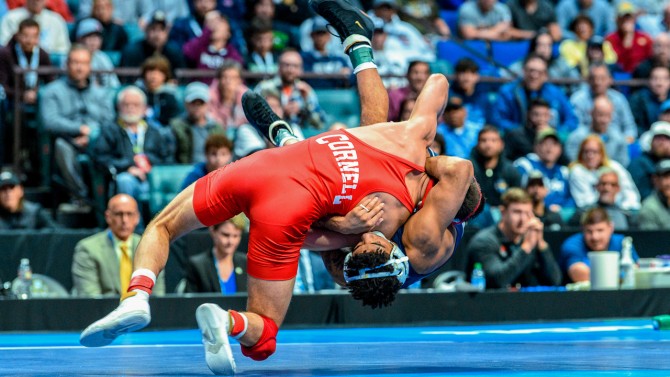
Yianni Diakomihalis ’23, left, and Vito Arujau ’24 both won national titles in their respective weight classes on March 18 at the NCAA Division I Wrestling Championships.
With care and NCAA bronze, Cornell wrestling caps historic season
By Caitlin Hayes, Cornell Chronicle
On March 18 in Tulsa, Oklahoma, just before Cornell wrestler Yianni Diakomihalis ’23 defended his national championship title at 149 pounds, his best friend and roommate, Vito Arujau ’24, won his own national title at 133, his first.
But Arujau didn’t bask.
“It’s probably one of the biggest moments of his life so far,” Diakomihalis said. “He just won, the cameras are all over him, and the coaches are all coming up to him. They celebrate for like two minutes, and he told the coaches, ‘I’m good; go take care of Yianni.’”
Diakomihalis, an interdisciplinary studies major in the College of Agriculture and Life Sciences (CALS), went on to win his match, becoming just the fifth wrestler in NCAA Division I history to win four national championships. He joins Kyle Dake ’13, Olympic bronze medalist and reigning world champion, making Cornell wrestling the only program with two four-time winners.
As a team, the Big Red placed third, with Chris Foca ’24 and Jacob Cardenas ‘24 placing in the top eight in their weight classes, earning All-America honors. It’s the 14th straight year Cornell has placed in the top 10 at NCAAs – only the University of Iowa can say the same – but this is the first year the Red has brought home a trophy (placing fourth or better) since 2012.
Arujau, a development sociology major in CALS, was honored as the tournament’s Most Outstanding Wrestler, Cornell’s fourth athlete to receive that award.
Earlier this season, the team clinched its 19th Ivy League championship in 20 years, and won the Eastern Intercollegiate Wrestling Association (EIWA) conference championship for the second straight year and 13th in the last 16. All told, Cornell now has 27 EIWA championships.
According to Mike Grey ’11, the David Dunlop ’59 Head Coach of Wrestling, Cornell’s success on the mat relies on the kind of care and selflessness Arujau displayed after his match.
“The number one thing is our culture,” Grey said. “Our guys are very supportive of each other and have each other’s best interests at heart, and it’s that brotherhood that ultimately leads us to be successful.”
Selflessness is fundamental to wrestling, Grey said, because in any given tournament, only one athlete competes in each weight class – just 10 athletes out of 40 on the Cornell team.
“That’s one of the pillars of our program: Our guys need to understand that they all matter, they’re all doing their job,” Grey said.
“Our program is designed to focus on every single kid in the room,” said J.J. Wilson ’23, a human biology, health, and society major in the College of Human Ecology, who spent much of his Cornell wrestling career supporting and training starters. “[Coach Grey] makes sure that every person is working their butt off the entire year, and it sets us apart. When someone gets injured, the next guy is ready to go.”
“Some of the most respected guys on the team are the backups,” said Diakomihalis. “I lean on these guys to help me, to give me the right look in the room, and to push me. And I haven’t even talked about out-of-the-room stuff – just having friends and these guys who I know have my back. I wouldn’t be anything without them.”
Learning by example
Grey, who took the reins as head coach in 2021 after working his way up in the coaching ranks, said the emphasis on each athlete has long been a priority in the program. It’s something he experienced as a two-time All-American and two-time EIWA champion, and has carried into his coaching from the example set by his predecessor, long-time head coach Rob Koll.
In addition, Grey looks to maximize potential. Diakomihalis said what sets Cornell apart is the coaches’ focus on helping athletes tailor their styles to their unique strengths. Grey also emphasizes a standard of excellence that acknowledges the program’s long history of success.
“I really want our guys to recognize and be mindful of everybody that’s come before them and what it means to step out on the mat and represent Cornell,” Grey said. “I like to remind them how privileged they are and how special it is to be at a place like Cornell. I tell them, ‘You’re living the life: You’re at Cornell. You’re on the wrestling team. You’re working hard. You have a great future ahead of you.’”
“Mike likes hard workers, and I think a lot of the new guys are kind of shocked at how hard it can be,” said Brendan Furman ’23, an industrial and labor relations major in the ILR School who served as the heavyweight backup and starter at various points in his career. “But there’s a reason we train like that, with the mindset and mentality of getting better through hard work.”
Furman married his high school girlfriend last summer but put married life in Pittsburgh on hold to stay at Cornell for a sixth year.
“There are so many things I’ve taken away from it. It’s hard even to articulate,” said Furman, who came back from two major knee injuries and surgeries that would have ended most athletes’ careers. “In the end, it’s just you out there on the mat, and all of your work, your failures, your sacrifices and shortcomings are highlighted in that match. If you’re doing the right things leading up to competition, it’ll show; if you’re not, it will show. You’re facing yourself.”
“The thing I love about this sport is the character it builds and the person it makes you into,” Grey said. “The life lessons are endless. Lessons you can use to raise your children, to lead within your career. You learn the value of hard work, that you’re not always going to get what you want, but the traits you acquire from the work you put in are going to make you the best version of yourself.”
Diakomihalis, who plans to train at Cornell after graduation with his sights on the 2024 Olympics, said he’s grown up at Cornell. He’s become a leader and has learned how to inspire and be inspired by those around him, and how to channel that into his wrestling.
“These coaches pour their hearts into me, and the guys – I know they’re all behind me,” he said. “If I go out and get slammed in the head and lose, it’s not like they’re going to turn their backs on me – it’s the other way around.”
They all know how badly they want to win, he said, and how hard they work to make that happen.
“But at the end of the day, we put the work in, and if it doesn’t work out, it doesn’t work out,” he said. “When you have that freedom, you can put that best version of yourself on the mat.”
Media Contact
Get Cornell news delivered right to your inbox.
Subscribe


